
AEWs perform field layout as part of their coconut production training.
PILI, Camarines Sur- From March 17-28, 2025, the Agricultural Training Institute-Regional Training Center V (ATI Bicol) hosted the "Training of Trainers on Coconut Production and Management" at its facility in Pili, Camarines Sur. This initiative, aligned with the Coconut Farmers and Industry Trust Fund (CFITF) Act, aimed to equip Agricultural Extension Workers (AEWs) and farmer-leaders with advanced skills to improve coconut farming practices, enhance productivity, and increase farmer incomes.
The first day of the training began with an introduction to the Coconut Industry Situation and an overview of the Coconut Farmers Industry Development Program, presented by Ms. Sofia Jusherine I. Bucad. In the afternoon, Ms. Federica M. Alim discussed coconut physiology, morphology, and growth stages, providing participants with a deeper understanding of coconut cultivation. Mr. Jay-Jay D. Recamara followed with a session on coconut varieties and seed nut selection, setting the stage for more detailed farming practices.
On the second day, the focus shifted to coconut plantation and management. Ms. Ilene M. Oriel led the session in the morning, followed by Mr. Randy T. Padre in the afternoon. Both shared expert knowledge on the proper care and maintenance of coconut plantations. The day ended with discussions on coconut pest management, led by Ms. Cynthia Fe L. Dava and Mr. Ramon B. Barona, and a session on disease management, led by Mr. Recamara. These lessons emphasized effective pest and disease control for healthier plantations.
The third day continued with practical knowledge on farm management, where Ms. Katherine O. Bongcayao discussed farm diversification and Ms. Rhea B. Bermundo provided insights on harvesting and postharvest operations. In the afternoon, Ms. Bermundo also covered different coconut processing techniques, explaining how these methods could add value to coconut products and improve profitability for farmers. These sessions were aimed at diversifying coconut farm income and improving overall sustainability.
On the fourth day, Ms. Jinnelyn N. Elejorde led a session on food safety standards, followed by Ms. Ailene C. Babelonia, who discussed Good Agricultural Practices (GAP) Certification and environmental safety. In the afternoon, Ms. Ma. Delpha Estrada explained the economics of coconut production, covering cost analysis, market trends, and how coconut farmers can enhance profitability. The day concluded with a session on extension and communication led by Ms. Justine Rose C. Tubig, who taught participants how to effectively communicate farming practices to local communities.
The final days of the training included discussions on e-learning, ICT applications, clustering, and community organizing. Participants also prepared for their micro-teaching sessions, where they demonstrated their newfound knowledge.
The training ended with the presentation of re-entry plans, which will be monitored over the next six months to track the application of skills learned. Feedback from participants was overwhelmingly positive, with all passing the post-test and noting significant improvements in their understanding of coconut farming practices.





